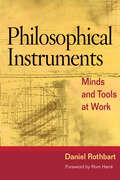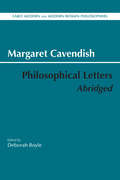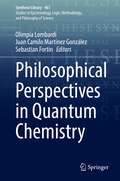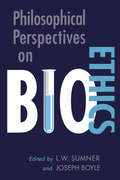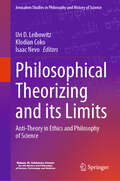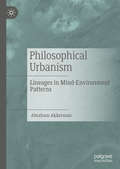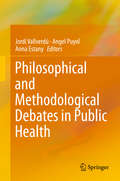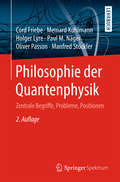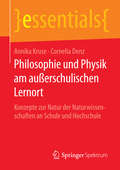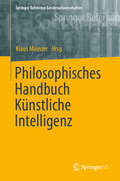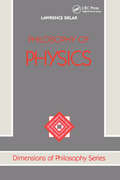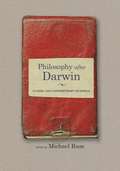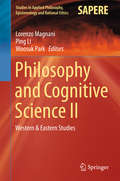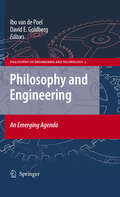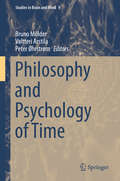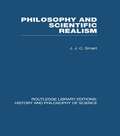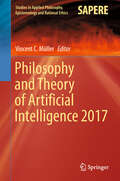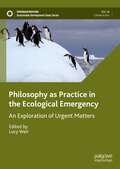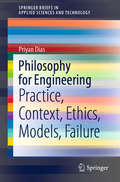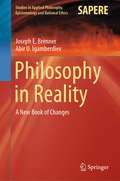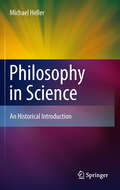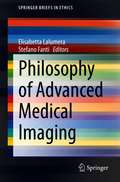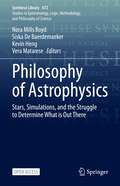- Table View
- List View
Philosophical Instruments: Minds and Tools at Work
by Daniel RothbartThe surprising roles of instruments and experimentation in acquiring knowledge In Philosophical Instruments Daniel Rothbart argues that our tools are not just neutral intermediaries between humans and the natural world, but are devices that demand new ideas about reality. Just as a hunter's new spear can change their knowledge of the environment, so can the development of modern scientific equipment alter our view of the world. Working at the intersections of science, technology, and philosophy, Rothbart examines the revolution in knowledge brought on by recent advances in scientific instruments. Full of examples from historical and contemporary science, including electron scanning microscopes, sixteenth-century philosophical instruments, and diffraction devices used by biochemical researchers, Rothbart explores the ways in which instrumentation advances a philosophical stance about an instrument's power, an experimenter's skills, and a specimen's properties. Through a close reading of engineering of instruments, he introduces a philosophy from (rather than of) design, contending that philosophical ideas are channeled from design plans to models and from model into the use of the devices.
Philosophical Letters, Abridged (Early Modern and Modern Women Philosophers)
by Margaret Cavendish"Margaret Cavendish (1623–1673) is a fascinating figure who is getting increasing attention by historians of philosophy these days, and for good reason. . . . She&’s an interesting advocate of a vitalist tradition emphasizing the inherent activity of matter, as well as its inherent perceptive faculties. She&’s also the perfect character to open students (and their teachers) up to a different seventeenth century, and a different cast of philosophical characters. This is an ideal book to use in the classroom. The Philosophical Letters (1664) gives us Cavendish&’s view of what was interesting and important in the philosophical world at that moment, a view of philosophy as it was at the time by an engaged participant. There are few documents like it in the history of philosophy. Deborah Boyle&’s Introduction provides a very accessible summary of Cavendish&’s natural philosophy, as well as good introductions to the other figures that Cavendish discusses in the book. Boyle&’s annotations are not extensive, but they are a great help in guiding the student toward an informed reading of the texts." —Daniel Garber, Princeton University
Philosophical Perspectives in Quantum Chemistry (Synthese Library #461)
by Olimpia Lombardi Sebastian Fortin Juan Camilo Martínez GonzálezThis book explores the philosophy and the foundations of quantum chemistry. It features chapters written by experts in the field. The contributions analyze quantum chemistry as a discipline, in particular, its relation with both chemistry and physics from the viewpoint of realism and reduction. Coverage includes such topics as quantum chemistry as an “in-between” discipline, molecular structure and quantum mechanics, quantum chemical models, and atoms and molecules in quantum chemistry.The interest of this book is twofold. First, the contributions aim to update and refresh the discussions regarding the foundations of quantum chemistry. Second, they seek to develop new philosophical perspectives that this discipline can suggest to philosophers of science.From its origins, quantum chemistry filled a problematic position in the disciplinary space. On the one hand, it is a branch of theoretical chemistry. On the other hand, it appeals essentially to theoretical tools coming from physics. This peculiar position triggered conceptual questions about its own identity. Inside this book, readers will find updated discussions on the foundations and the philosophy of this complex discipline.
Philosophical Perspectives on Bioethics
by L. Wayne Sumner Joseph BoyleHow should we attempt to resolve concrete bioethical problems? How are we to understand the role of bioethics in the health care system, government, and academe? This collection of original essays raises these and other questions about the nature of bioethics as a discipline. The contributors to the volume discuss various approaches to bioethical thinking and the political and institutional contexts of bioethics, addressing underlying concerns about the purposes of its practice. Included are extended analyses of such important issues as the conduct of clinical trials, euthanasia, justice in health care, the care of children, cosmetic surgery, and reproductive technologies.
Philosophical Theorizing and its Limits: Anti-Theory in Ethics and Philosophy of Science (Jerusalem Studies in Philosophy and History of Science)
by Uri D. Leibowitz Klodian Coko Isaac NevoThis book brings together scholars from ethics and philosophy of science in order to identify ways in which insights gleaned from one subfield can shed light on the other. The book focuses on two radical Anti-Theory movements that emerged in the 1970’s and 1980’s, one in philosophy of science and the other in ethics. Both movements challenged attempts to supply general, systematized philosophical theories within their domains and thus invited the reconsideration of what philosophical theorizing can and should offer. Each of these movements was domain-specific – that is, each criticized the aspirations to philosophical theories within its own domain and advanced arguments aimed at philosophers within their own specific subfield. The innovative systematic comparative examination of these movements by scholars from each domain sheds new light on some familiar debates, offers new and exciting paths of research to pursue in each domain, provides insight into the place of science and ethics in contemporary life and culture, and enables a fresh view on the longstanding and alluring philosophical aspiration for a fully general, absolute theory of reality and an ultimate objective foundational theory of knowledge.
Philosophical Urbanism: Lineages in Mind-Environment Patterns
by Abraham AkkermanThis book expands on the thought of Walter Benjamin by exploring the notion of modern mind, pointing to the mutual and ongoing feedback between mind and city-form. Since the Neolithic Age, volumes and voids have been the founding constituents of built environments as projections of gender—as spatial allegories of the masculine and the feminine. While these allegories had been largely in balance throughout the early history of the city, increasingly during modernity, volume has overcome void in city-form. This volume investigates the pattern of Benjamin's thinking and extends it to the larger psycho-cultural and urban contexts of various time periods, pointing to environ/mental progression in the unfolding of modernity.
Philosophical and Methodological Debates in Public Health
by Jordi Vallverdú Angel Puyol Anna EstanyThis interdisciplinary volume gathers selected, refereed contributions on various aspects of public health from several disciplines and research fields, including the philosophy of science, epidemiology, statistics and ethics. The contributions were originally presented at the 1st Barcelona conference of “Philosophy of Public Health” (5th – 7th May 2016). This book is intended for researchers interested in public health and the contemporary debates surrounding it.
Philosophie der Quantenphysik: Einführung Und Diskussion Der Zentralen Begriffe Und Problemstellungen Der Quantentheorie Für Physiker Und Philosophen
by Paul M. Näger Cord Friebe Meinard Kuhlmann Holger Lyre Oliver Passon Manfred StöcklerDieses Buch liefert dem Leser eine aktuelle und fundierte Einführung in die Philosophie der Quantenphysik. Obwohl sich die Quantentheorie durch spektakuläre empirische Erfolge auszeichnet, wird bis heute kontrovers diskutiert, wie sie zu verstehen ist. In diesem Werk geben die Autoren einen Überblick über die zahlreichen philosophischen Herausforderungen: Verletzen Quantenobjekte das Prinzip der Kausalität? Sind gleichartige Teilchen ununterscheidbar und daher keine Individuen? Behalten Quantenobjekte in der zeitlichen Entwicklung ihre Identität? Wie verhält sich ein zusammengesetztes Quantensystem zu seinen Teilen? Diese Fragen werden im Rahmen verschiedener Deutungsansätze der Quantentheorie diskutiert. Ein Ausblick in die Quantenfeldtheorie verschärft das Hauptproblem der Nichtlokalität.Philosophie der Quantenphysik richtet sich an Philosophiestudierende mit Interesse für Physik, macht Physikerinnen und Physiker mit den philosophischen Fragen ihres Faches vertraut und liefert Lehramtsstudierenden und Lehrern Anregungen für den gymnasialen Physik-Unterricht. Das Buch schließt damit eine Lücke zwischen populären Einführungen und spezialisierten Monografien zur Philosophie der Quantenphysik im deutschsprachigen Lehrbuchmarkt. In der vorliegenden zweiten Auflage wurde das Kapitel zu Verschränkung und Nicht-Lokalität deutlich erweitert und jedes Kapitel mit Übungsaufgaben und Musterlösungen ergänzt.
Philosophie und Physik am außerschulischen Lernort: Konzepte zur Natur der Naturwissenschaften an Schule und Hochschule (essentials)
by Annika Kruse Cornelia DenzDieses essential zeigt am Beispiel des innovativen Projekts ,,Selberdenken!" auf, wie eine Verbindung von Naturwissenschaft und Philosophie auf der Basis von forschend-entdeckendem Lernen und explorativem Experimentieren an Schule und Hochschule gelingt. Fragen wie ,,Was denkt man, wenn man nach den Bausteinen der Materie sucht?" und ,,Wie schafft man es, Daten durch die Luft zu transportieren?" bieten dabei das Potenzial, Jugendliche für ein tiefgreifendes Verständnis unserer technisierten Welt zu begeistern. Motor für diese kritisch-neugierige Perspektive ist die Naturphilosophie, die auf lebendige Weise neben der fachlichen Dimension auch die Hintergründe von Naturwissenschaft thematisiert.
Philosophisches Handbuch Künstliche Intelligenz
by Klaus MainzerDas Handbuch schlägt die Brücke von der Grundlagenforschung zum Orientierungswissen. Es greift damit die Bildungs- und Ausbildungsziele der bundesweiten MINT-Initiative auf, die Mathematik (M), Informatik (I), Naturwissenschaft (N) und Technik (T) als fachübergreifendes Schlüsselwissen für technisch-wissenschaftlich gestützte Gesellschaften versteht. Additives Wissen und Ausbildung in getrennten Disziplinen der Mathematik, Informatik, Naturwissenschaft und Technik reichen aber nicht aus. In der Künstlichen Intelligenz wachsen diese Disziplinen mit den Human- und Sozialwissenschaften zusammen. Zunächst sollen die Grundlagen der KI-Forschung methodisch und begrifflich geklärt werden. Philosophie wird als Grundlagenforschung verstanden, die logisch und methodisch die Prinzipien von Wissenschaft und Technik untersucht. Daher handelt es sich um ein „Philosophisches Handbuch“ (in diesem Fall der KI) und nicht um eine Bindestrich-Philosophie, also ein Handbuch der Philosophie einer Einzelwissenschaft. Denken und Wissen selber und das Selbstverständnis der Menschen verändern sich durch KI grundlegend.
Philosophy Of Physics (Dimensions Of Philosophy Ser. #6)
by Lawrence SklarThe study of the physical world had its origins in philosophy, and, two-and-one-half millennia later, the scientific advances of the twentieth century are bringing the two fields closer together again. So argues Lawrence Sklar in this brilliant new text on the philosophy of physics.Aimed at students of both disciplines, Philosophy of Physics is a broad overview of the problems of contemporary philosophy of physics that readers of all levels of sophistication should find accessible and engaging. Professor Sklar's talent for clarity and accuracy is on display throughout as he guides students through the key problems: the nature of space and time, the problems of probability and irreversibility in statistical mechanics, and, of course, the many notorious problems raised by quantum mechanics.Integrated by the theme of the interconnectedness of philosophy and science, and linked by many references to the history of both disciplines, Philosophy of Physics is always clear, while remaining faithful to the complexity and integrity of the issues. It will take its place as a classic text in a field of fundamental intellectual importance.
Philosophy after Darwin: Classic and Contemporary Readings
by Michael RuseWittgenstein famously remarked in 1923, "Darwin's theory has no more relevance for philosophy than any other hypothesis in natural science." Yet today we are witnessing a major revival of interest in applying evolutionary approaches to philosophical problems. Philosophy after Darwin is an anthology of essential writings covering the most influential ideas about the philosophical implications of Darwinism, from the publication of On the Origin of Species to today's cutting-edge research.Michael Ruse presents writings by leading modern thinkers and researchers--including some writings never before published--together with the most important historical documents on Darwinism and philosophy, starting with Darwin himself. Included here are Herbert Spencer, Friedrich Nietzsche, Thomas Henry Huxley, G. E. Moore, John Dewey, Konrad Lorenz, Stephen Toulmin, Karl Popper, Edward O. Wilson, Hilary Putnam, Philip Kitcher, Elliott Sober, and Peter Singer. Readers will encounter some of the staunchest critics of the evolutionary approach, such as Alvin Plantinga, as well as revealing excerpts from works like Jack London's The Call of the Wild. Ruse's comprehensive general introduction and insightful section introductions put these writings in context and explain how they relate to such fields as epistemology, philosophy of mind, philosophy of language, and ethics.An invaluable anthology and sourcebook, Philosophy after Darwin traces philosophy's complicated relationship with Darwin's dangerous idea, and shows how this relationship reflects a broad movement toward a secular, more naturalistic understanding of the human experience.
Philosophy and Cognitive Science II
by Ping Li Lorenzo Magnani Woosuk ParkThe book shows how eastern and western perspectives and conceptions can be used to addresses recent topics laying at the crossroad between philosophy and cognitive science. It reports on new points of view and conceptions discussed during the International Conference on Philosophy and Cognitive Science (PCS2013), held at the Sun Yat-sen University, in Guangzhou, China, and the 2013 Workshop on Abductive Visual Cognition, which took place at KAIST, in Deajeon, South Korea. The book emphasizes an ever-growing cultural exchange between academics and intellectuals coming from different fields. It juxtaposes research works investigating new facets on key issues between philosophy and cognitive science, such as the role of models and causal representations in science; the status of theoretical concepts and quantum principles; abductive cognition, vision, and visualization in science from an eco-cognitive perspective. Further topics are: ignorance immunization in reasoning; moral cognition, violence, and epistemology; and models and biomorphism. The book, which presents a unique and timely account of the current state-of-the art on various aspects in philosophy and cognitive science, is expected to inspire philosophers, cognitive scientists and social scientists, and to generate fruitful exchanges and collaboration among them.
Philosophy and Engineering: An Emerging Agenda
by Ibo van de Poel David E. GoldbergWhereas science, technology, and medicine have all called forth dedicated philosophical investigations, a fourth major contributor to the technoscientific world in which we all live - that is, engineering - has been accorded almost none of the philosophical attention it deserves. This volume thus offers a first characterisation of this important new field, by some of the primary philosophers and ethicists interested in engineering and leading engineers interested in philosophical reflections. The volume deals with such questions as: What is engineering? In what respect does engineering differ from science? What ethical problems does engineering raise? By what ethical principles are engineers guided? How do engineers themselves conceive of their profession? What do they see as the main philosophical challenges confronting them in the 21st century? The authors respond to these and other questions from philosophical and engineering view points and so illustrate how together they can meet the challenges and realize the opportunities present in the necessary encounters between philosophy and engineering - encounters that are ever more important in an increasingly engineered world and its problematic futures.
Philosophy and Psychology of Time
by Bruno Mölder Valtteri Arstila Peter ØhrstrømThis book is an edited collection of papers from international experts in philosophy and psychology concerned with time. The collection aims to bridge the gap between these disciplines by focussing on five key themes and providing philosophical and psychological perspectives on each theme. The first theme is the concept of time. The discussion ranges from the folk concept of time to the notion of time in logic, philosophy and psychology. The second theme concerns the notion of present in the philosophy of mind, metaphysics, and psychology. The third theme relates to continuity and flow of time in mind. One of the key questions in this section is how the apparent temporal continuity of conscious experience relates to the possibly discrete character of underlying neural processes. The fourth theme is the timing of experiences, with a focus on the perception of simultaneity and illusions of temporal order. Such effects are treated as test cases for hypotheses about the relationship between the subjective temporal order of experience and the objective order of neural events. The fifth and the final theme of the volume is time and intersubjectivity. This section examines the role of time in interpersonal coordination and in the development of social skills. The collection will appeal to both psychologists and philosophers, but also to researchers from other disciplines who seek an accessible overview of the research on time in psychology and philosophy.
Philosophy and Scientific Realism (Routledge Library Editions: History & Philosophy of Science)
by J J SmartOriginally published in 1963. In an introductory chapter the author argues that philosophy ought to be more than the art of clarifying thought and that it should concern itself with outlining a scientifically plausible world view. Early chapters deal with phenomenalism and the reality of theoretical entities, and with the relation between the physical and biological sciences. Free will, issues of time and space and man’s place in nature are covered in later chapters.
Philosophy and Theory of Artificial Intelligence 2017 (Studies in Applied Philosophy, Epistemology and Rational Ethics #44)
by Vincent C. MüllerThis book reports on the results of the third edition of the premier conference in the field of philosophy of artificial intelligence, PT-AI 2017, held on November 4 - 5, 2017 at the University of Leeds, UK. It covers: advanced knowledge on key AI concepts, including complexity, computation, creativity, embodiment, representation and superintelligence; cutting-edge ethical issues, such as the AI impact on human dignity and society, responsibilities and rights of machines, as well as AI threats to humanity and AI safety; and cutting-edge developments in techniques to achieve AI, including machine learning, neural networks, dynamical systems. The book also discusses important applications of AI, including big data analytics, expert systems, cognitive architectures, and robotics. It offers a timely, yet very comprehensive snapshot of what is going on in the field of AI, especially at the interfaces between philosophy, cognitive science, ethics and computing.
Philosophy and the Foundations of Dynamics
by Lawrence SklarAlthough now replaced by more modern theories, classical mechanics remains a core foundational element of physical theory. From its inception, the theory of dynamics has been riddled with conceptual issues and differing philosophical interpretations and throughout its long historical development, it has shown subtle conceptual refinement. The interpretive program for the theory has also shown deep evolutionary change over time. Lawrence Sklar discusses crucial issues in the central theory from which contemporary foundational theories are derived and shows how some core issues (the nature of force, the place of absolute reference frames) have nevertheless remained deep puzzles despite the increasingly sophisticated understanding of the theory which has been acquired over time. His book will be of great interest to philosophers of science, philosophers in general and physicists concerned with foundational interpretive issues in their field.
Philosophy and the Precautionary Principle
by Daniel SteelScholars in philosophy, law, economics and other fields have widely debated how science, environmental precaution, and economic interests should be balanced in urgent contemporary problems, such as climate change. One controversial focus of these discussions is the precautionary principle, according to which scientific uncertainty should not be a reason for delay in the face of serious threats to the environment or health. While the precautionary principle has been very influential, no generally accepted definition of it exists and critics charge that it is incoherent or hopelessly vague. This book presents and defends an interpretation of the precautionary principle from the perspective of philosophy of science, looking particularly at how it connects to decisions, scientific procedures, and evidence. Through careful analysis of numerous case studies, it shows how this interpretation leads to important insights on scientific uncertainty, intergenerational justice, and the relationship between values and policy-relevant science.
Philosophy as Practice in the Ecological Emergency: An Exploration of Urgent Matters (Sustainable Development Goals Series)
by Lucy WeirThis book argues that philosophy is as practical as plumbing and what we need right now is what philosophers can offer as philosophers to help us all, our species, and beyond, through this ecological emergency, this climate change, this anthropocene. This book is about the meaning and purpose of philosophy as a way of, a practice of, responding to the ecological emergency, which includes climate change, biodiversity loss, pollution, habitat destruction, and all the associated impacts that fragment, and threaten to create collapse, among the systems that created and sustain us. There are the related economic and social impacts, the fragmentation of communities and political ideologies through attitude polarisation, and the increasing threats to systems by those who seek to promote further exploitation at the expense of attempts to regain some system of cooperation and an attitude of compassion which is at the heart of our survival strategies as a species. Philosophy has always sought to address questions related both to our place in the universe, and to how to live, given our understanding of our place. Those of us committed to a philosophical life have used a range of metaphors and narratives to enlighten, and to exhort to action, those who would seek to understand what to do, how, and why. Philosophy has played a key role in helping us as a species to respond to the ecological emergency. What, then, is the practice of philosophy, given that we’re in an ecological emergency?This question is the thread, and it forms the framework for the dialogue that runs through the book.
Philosophy for Engineering: Practice, Context, Ethics, Models, Failure (SpringerBriefs in Applied Sciences and Technology)
by Priyan DiasThis book highlights the unique need for philosophy among engineers, which stems from issues regarding their knowledge (epistemology), role or being (ontology) and influence (ethics). It discusses practice, context, ethics, models and failure as key aspects of engineering, and provides an easy but essential introduction to philosophy for engineers by presenting four key philosophers and linking them to these aspects: Karl Popper (failure), Thomas Kuhn (models), Michael Polanyi (practice & ethics) and Martin Heidegger (context & ethics). Popper, Kuhn and Polanyi are philosophers of science (epistemologists) who have challenged the view that science is a ‘cool, detached’ discipline, since it also depends on human imagination (Popper), consensus (Kuhn) and judgment plus artistry (Polanyi); factors that are central to engineering. Heidegger (an ontologist) critiqued technology on the one hand (ethics), but also stressed the importance of ‘doing’ over ‘knowing,’ thus ‘authenticating’ the highly pragmatic engineering profession. Science is the ‘core’ component of engineering, which is overlaid by a variety of heuristics . Practice-based knowledge can be formalized, with artificial intelligence (AI) offering a valuable tool for engineering, just as mathematics has done for science. The book also examines systems thinking in engineering. Featuring numerous diagrams, tables and examples throughout, the book is easily accessible to engineers.
Philosophy in Reality: A New Book of Changes (Studies in Applied Philosophy, Epistemology and Rational Ethics #60)
by Abir U. Igamberdiev Joseph E. BrennerPhilosophy in Reality offers a new vision of the relation between science and philosophy in the framework of a non-propositional logic of real processes, grounded in the physics of the real world. This logical system is based on the work of the Franco-Romanian thinker Stéphane Lupasco (1900-1988), previously presented by Joseph Brenner in the book Logic in Reality (Springer, 2008). The present book was inspired in part by the ancient Chinese Book of Changes (I Ching) and its scientific-philosophical discussion of change. The emphasis in Philosophy in Reality is on the recovery of dialectics and semantics from reductionist applications and their incorporation into a new synthetic paradigm for knowledge. Through an original re-interpretation of both classical and modern Western thought, this book addresses philosophical issues in scientific fields as well as long-standing conceptual problems such as the origin, nature and role of meaning, the unity of knowledge and the origin of morality. In a rigorous transdisciplinary manner, it discusses foundational and current issues in the physical sciences - mathematics, information, communication and systems theory and their implications for philosophy. The same framework is applied to problems of the origins of society, the transformation of reality by human subjects, and the emergence of a global, sustainable information society. In summary, Philosophy in Reality provides a wealth of new perspectives and references, supporting research by both philosophers and physical and social scientists concerned with the many facets of reality.
Philosophy in Science
by Michael HellerThe traditional topics of the "philosophy of nature" -- space, time, causality, the structure of the universe -- are overwhelmingly present in our modern scientific theories. This book traces the complex paths that discussion of these topics has followed, from Plato and Aristotle, through Descartes, Leibniz, Kant and other great thinkers, right up to the relativistic cosmologies and the grand unified theories of contemporary science. In the light of this historical development, it becomes clear that modern science gives us not only a technological power over the world, but also a deeper understanding of physical reality. In this sense, science could be regarded as an heir to the traditional "philosophy of nature". Moreover, the reader will learn why science itself deserves to be the subject of philosophical reflection.
Philosophy of Advanced Medical Imaging (SpringerBriefs in Ethics)
by Stefano Fanti Elisabetta LalumeraThis is the first book to explore the epistemology and ethics of advanced imaging tests, in order to improve the critical understanding of the nature of knowledge they provide and the practical consequences of their utilization in healthcare. Advanced medical imaging tests, such as PET and MRI, have gained center stage in medical research and in patients’ care. They also increasingly raise questions that pertain to philosophy: What is required to be an expert in reading images? How are standards for interpretation to be fixed? Is there a problem of overutilization of such tests? How should uncertainty be communicated to patients? How to cope with incidental findings? This book is of interest and importance to scholars of philosophy of medicine at all levels, from undergraduates to researchers, to medical researchers and practitioners (radiologists and nuclear physicians) interested in a critical appraisal of the methodology of their discipline and in the ethical principles and consequences of their work.
Philosophy of Astrophysics: Stars, Simulations, and the Struggle to Determine What is Out There (Synthese Library #472)
by Kevin Heng Nora Mills Boyd Siska De Baerdemaeker Vera MatareseThis is an open access book. This book, the first edited collection of its kind, explores the recent emergence of philosophical research in astrophysics. It assembles a variety of original essays from scholars who are currently shaping this field, and it combines insightful overviews of the current state of play with novel, significant contributions. It therefore provides an ideal source for understanding the current debates in philosophy of astrophysics, and it offers new ideas for future cutting-edge research. The selection of essays offered in this book addresses methodological and metaphysical questions that target a wide range of topics, including dark matter, black holes, astrophysical observations and modelling.The book serves as the first standard resource in philosophy of astrophysics for all scholars who work in the field and want to expand or deepen their knowledge, but it also provides an accessible guide for all those philosophers and scientists who are interested in getting a first, basic understanding of the main issues in philosophy of astrophysics.
